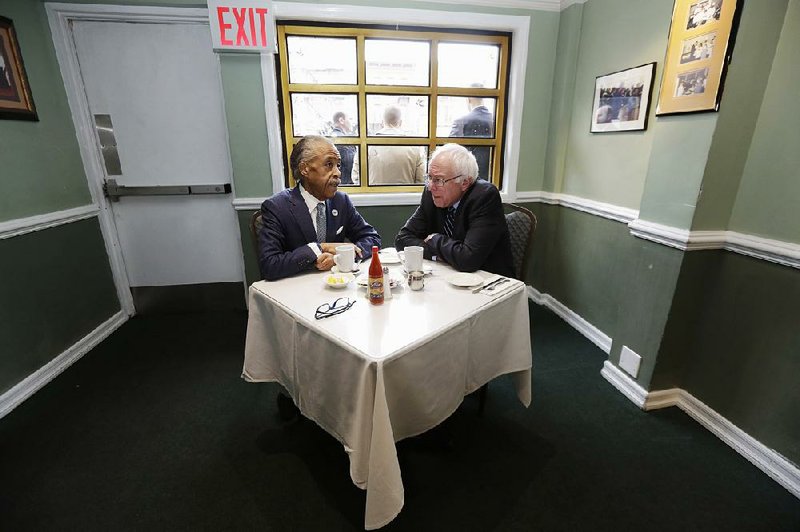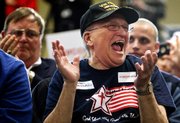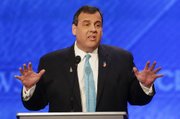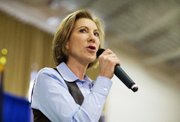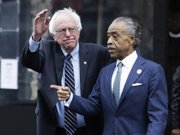MANCHESTER, N.H. -- After decisive wins by U.S. Sen. Bernie Sanders and Republican billionaire Donald Trump in New Hampshire, the two campaigns sought Wednesday to build momentum while some other candidates were left reassessing strategies.
FULL ELECTION COVERAGE
While Trump did the rounds on television, Sanders was welcomed in New York City's Harlem district by the Rev. Al Sharpton.
Rejected in New Hampshire, which she won in 2008, Hillary Clinton sought redemption in Nevada, where a more diverse group of voters awaited her and Sanders.
New Hampshire also proved ill for two Republicans, with New Jersey Gov. Chris Christie and former Hewlett-Packard CEO Carly Fiorina dropping out after disappointing results.
The remaining candidates now are retooling their pitches for the contests ahead for the GOP: the Feb. 20 primary in South Carolina, a state dominated by staunch conservatives. Then comes the party's Nevada caucus on Feb. 23.
The Democrats' calendar runs the reverse -- the Nevada caucus on Feb. 20 and then the Feb. 27 primary in South Carolina, with its strong black voter base.
Two GOP candidates found their footing in New Hampshire -- Ohio Gov. John Kasich, who came in second, and former Florida Gov. Jeb Bush, who placed fourth. They argued Wednesday that they had defied the pundits and would fight to regain their party's political center.
"We need a proven leader in Washington, D.C., to fix the mess, not just talk about how bad things are," Bush said in an interview on MSNBC's Morning Joe.
While Trump is "a gifted politician," he "would be a disaster as our nominee," he added.
"My case will be national security," said Bush, who had already arrived in South Carolina, a state that boasts a large number of active members of the armed forces as well as military retirees.
Kasich, for his part, told the hosts of NBC's Today show that he "finally broke through" in New Hampshire because he provided an upbeat assessment about how the two parties could work together.
"I was the only one with a really positive message," he said.
In South Carolina, however, Kasich has a relatively small operation compared with those of his rivals, who are setting up another make-or-break primary.
Almost all the Republicans have spent months building campaigns and blanketing airwaves in South Carolina, which heralds the start of the GOP campaign's foray into the South. A slew of Southern states -- Arkansas among them -- will vote for the "Super Tuesday" primaries on March 1.
Already, more than $32 million has been spent on TV ads in South Carolina, according to CMAG/Kantar Media data -- much of it by Right to Rise, the super political action committee backing Bush.
Bush also has turned to his brother, George W. Bush, for help in South Carolina. The candidate's campaign debuted a new ad featuring the former president, who plans to campaign in the state.
Undeterred, Kasich met with voters at a business in Charleston, working to burnish his reputation as a results-oriented leader.
"If you don't go to the gym, you get flabby," Kasich said. "And if the country doesn't solve its problems, it gets flabby."
U.S. Sen. Ted Cruz of Texas, who won the lead-off Iowa caucuses but largely sat out New Hampshire, took third in New Hampshire. In South Carolina, he drew contrasts with Trump as he told a crowd of 500 in Myrtle Beach that Texans and South Carolinians are more alike than not.
"We love God; we're gun owners, military veterans; and we're fed up with what's happening in Washington," Cruz said.
Trump, however, appeared confident that his popularity could carry him through.
While he would not identify his main rival -- "I don't want to talk about favorites. I think I'm doing well," he said -- Trump told NBC's Matt Lauer and Savannah Guthrie that the crowds he had attracted in Iowa and New Hampshire would translate into votes across the country.
"There's something going on," he said. "There's a movement."
The GOP finishes
With 100 percent of precincts reporting in New Hampshire, Trump had 35.3 percent of the vote to Kasich's 15.8 percent.
Behind Cruz's finish at 11.7 percent were Bush with 11 percent and U.S. Sen. Marco Rubio of Florida with 10.6 percent.
Heralding the end of his campaign, Christie laid claim sixth place with 7.4 percent.
Late Wednesday afternoon, Christie spokesman Samantha Smith said Christie shared his decision with staff members at his campaign headquarters in Morristown, N.J., and was calling donors and other supporters.
With 4.1 percent and a seventh-place finish, Fiorina announced her decision to call it quits on Facebook.
"This campaign was always about citizenship -- taking back our country from a political class that only serves the big, the powerful, the wealthy, and the well connected," she wrote. "I will continue to serve in order to restore citizen government to this great nation so that together we may fulfill our potential."
Closing out the Republican field were retired neurosurgeon Ben Carson, with 2.3 percent of the vote, and former Virginia Gov. Jim Gilmore, who snagged a scant 125 votes.
Ahead of the New Hampshire voting, the Republican race remained in flux over the weekend after a Saturday debate in which Rubio faltered in the face of stinging barbs from Christie.
Rubio acknowledged the debate dive but on Wednesday tried to project resolve that he can climb back to the top.
"We're going to get back to the fundamentals. ... We're going to be the nominee," he said on NBC's Today show. "It is just going to take a little longer, but we are going to get there."
His campaign manager maintained confidence in the potential of a drawn-out race for the GOP nomination.
"We very easily could be looking at May -- or the convention," Terry Sullivan said.
Sanders money boost
On the Democratic side, Sanders defeated Clinton by the widest margin in the history of New Hampshire primaries, garnering 60.4 percent compared with her 38 percent.
Sanders -- the first Jewish person to win any state's presidential primary -- reported raising $7.1 million in the 24 hours since polls closed, boosting the campaign as it expands in Nevada and South Carolina and the Super Tuesday states.
In a news release, his campaign called the flurry of donations a record-breaking amount, with an average donation of $34.
Both Clinton and Sanders worked to undercut each other among blacks and Hispanics with less than two weeks until Nevada's contest and a little more than that until South Carolina's.
While Sanders met with Sharpton, Clinton announced plans to campaign with the mother of Sandra Bland, a black woman who died while in police custody. And Clinton's campaign deployed South Carolina state Rep. Todd Rutherford to vouch for her support for members of minority groups.
"Secretary Clinton has been involved in South Carolina for the last 40 years," Rutherford said. "Bernie Sanders has talked about these issues for the last 40 days."
Sanders wasted no time in capitalizing on his strong showing in New Hampshire, flying to New York City with his wife, Jane, to court Sharpton. Former NAACP leader Benjamin Jealous, who recently endorsed Sanders, also attended the meeting.
Nevada, with a sizable Hispanic population, will serve as a test of Sanders' message that rang true in the largely white states of Iowa and New Hampshire. Polls in the state have tightened, and the Sanders operation has caught up with the Clinton campaign in sending organizers to the state.
"We are really looking forward for the opportunity to compete for votes from Latinos and African-Americans; Bernie Sanders has an incredibly powerful story to tell," said Tad Devine, a senior adviser to the Sanders campaign. "There is tremendous movement with Latino voters in Nevada."
The Clinton campaign has worked since April to court Hispanic voters in Nevada, including holding a gathering in the Las Vegas suburbs at which Clinton appeared alongside the children of illegal aliens, and has promised to go further than Obama to overhaul the immigration system.
But on Tuesday, the Clinton campaign sought to play down expectations there, too. "There's an important Hispanic element to the Democratic caucus in Nevada," a spokesman, Brian Fallon, told MSNBC. "But it's still a state that is 80 percent white voters. You have a caucus-style format, and he'll have the momentum coming out of New Hampshire."
Sanders and Clinton will meet head-to-head again tonight for a round of debating in Milwaukee. The CNN-sponsored event will be broadcast on PBS at 8 p.m. NewsHour co-anchors Gwen Ifill and Judy Woodruff will moderate.
Information for this article was contributed by Dan Balz, David A. Fahrenthold and Juliet Eilperin, Jose A. DelReal, Jenna Johnson, Sean Sullivan, John Wagner, Michael Kranish, Abby Phillip, Anne Gearan, Ed O'Keefe, Karen Tumulty and Paul Farhi of The Washington Post; by Bill Barrow, Josh Lederman, Steve Peoples, Ken Thomas, Kathleen Ronayne, Sergio Bustos, Julie Bykowicz, Lisa Lerer and Jill Colvin The Associated Press; by David Knowles and Arit John of Bloomberg News; and by Ashley Parker, Amy Chozick and Jason Horowitz of The New York Times.
A Section on 02/11/2016
